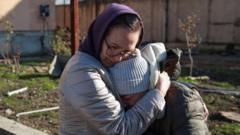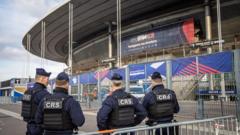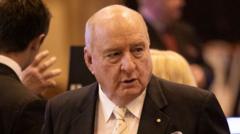
As the Ukraine-Russia conflict approaches its 1,000-day mark, significant geopolitical moves are being made by both the Biden administration and Russia, with an eye on the potential return of Donald Trump to the White House.
President Biden has made two notable decisions to support Ukraine: allowing Kyiv to fire long-range ATACMS missiles into Russian territory and promising to send anti-personnel landmines. These actions were reportedly prompted by the arrival of thousands of North Korean troops to the front line, which the US views as a “massive escalation.”
Simultaneously, Russia has escalated tensions by modifying its nuclear weapons doctrine. President Vladimir Putin has loosened the conditions for nuclear weapon use, which Moscow claims “effectively eliminates” the possibility of battlefield defeat. Experts suggest Putin sees the current moment as an opportunity to gain an upper hand in the conflict.
Russia launched its largest aerial attack on Ukraine in almost three months, with several Western embassies closing in anticipation of further strikes. Analysts like Mykhaylo Samus believe these actions are designed to send a psychological message ahead of the Washington DC power transfer.
The potential Trump presidency looms large in current strategic calculations. While Trump himself has remained silent, his team has expressed concerns about escalation. Donald Trump Jr. accused Biden of trying to “get World War Three” started before his father’s return to office.
Ukrainian President Volodymyr Zelensky remains resolute, presenting a 10-point “resilience plan” to parliament. In a US television interview, he candidly acknowledged that without US military aid, Ukraine would likely lose the war, though they would continue fighting.
Putin’s minimal demands for ending the conflict include Ukraine remaining neutral, despite Ukraine’s constitutional commitment to joining NATO and the EU. A Reuters report suggests Putin might be willing to withdraw from small territories, but nothing substantial.
Ukrainian experts like Mykola Bielieskov emphasize the importance of preventing major Russian breakthroughs in the eastern regions, believing that any significant Russian success would allow them to dictate terms.
Experts like Jade McGlynn are skeptical about the possibility of a lasting peace deal under Trump. They argue that any settlement leaving Ukraine significantly weakened would lead to internal political chaos.
The mood in Moscow appears confident, with many believing it’s only a matter of time before Ukraine falls. However, Putin will need to be more strategic from January onwards, considering Trump’s potential approach to the conflict.
Tatiana Stanovaya from the Carnegie Russia Eurasia Center suggests Putin’s nuclear doctrine changes are more about intimidating Western elites than actually initiating World War III.
As the conflict continues, Ukrainian resolve remains strong, with a sentiment that they may need to “outlive someone in Moscow” to achieve their goals of territorial integrity.









